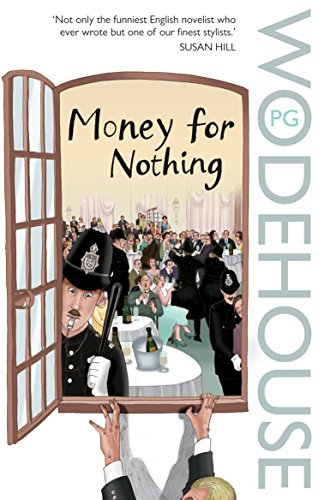Money For Nothing, by P.G. Wodehouse
Jul 17
2023

P.G. Wodehouse had his flaws. Even if one separates the art from the artist, his stories routinely feature contradictory character backgrounds, bewildering British-to-American editing choices, and a LOT of recycled one-liners. None of those put much of a dent in his reputation as the funniest English writer in history, but if you're fussy about details, you might be better off sticking with his standalone work (although you'd be missing out on a lot of his best bits, in my opinion.) And if you're in the market for a standalone Wodehouse novel, this week we're giving away a copy of Money For Nothing.
Published in 1928*, Money for Nothing is set in the quiet village of Rudge-in-the-Vale, which has recently been rocked by a quarrel between two former friends, Colonel Wyvern and Lester Carmody. The mood in the village sinks even lower when the penny-pinching Carmody signs up for a slimming session at a local health farm, only to discover that they require cold showers, don't allow cigarettes, and take their “no refunds” policy seriously. Add in a pair of American grifters hoping to sell some fake oil stock and a thwarted romance between Carmody's nephew and Wyvern's daughter, and this once-bucolic village might never recover its former peace.
Except for its variety of settings, Money For Nothing has that air of cheerful, slightly frantic artificiality that makes me wonder if Wodehouse originally intended it for the stage. The language, as always, is a pleasure, although I can't remember any passages of truly outstanding genius. The characters are fun (my favorites are the dog Emily, Mr. Bywater the chemist, and the enterprising problem-solver Dolly Molloy), the plot is charmingly ridiculous, and a satisfying ending is never in doubt. It is in many ways the ideal summer vacation read: sunny, silly, and utterly stress-free.
*Unsurprisingly for the era, there are a scattering of problematic elements, including one anti-Semitic comment and what I think might be a racist description of a song performance? The language is so old-fashioned I'd have to look it up, and I don't want that in my search history.
Published in 1928*, Money for Nothing is set in the quiet village of Rudge-in-the-Vale, which has recently been rocked by a quarrel between two former friends, Colonel Wyvern and Lester Carmody. The mood in the village sinks even lower when the penny-pinching Carmody signs up for a slimming session at a local health farm, only to discover that they require cold showers, don't allow cigarettes, and take their “no refunds” policy seriously. Add in a pair of American grifters hoping to sell some fake oil stock and a thwarted romance between Carmody's nephew and Wyvern's daughter, and this once-bucolic village might never recover its former peace.
Except for its variety of settings, Money For Nothing has that air of cheerful, slightly frantic artificiality that makes me wonder if Wodehouse originally intended it for the stage. The language, as always, is a pleasure, although I can't remember any passages of truly outstanding genius. The characters are fun (my favorites are the dog Emily, Mr. Bywater the chemist, and the enterprising problem-solver Dolly Molloy), the plot is charmingly ridiculous, and a satisfying ending is never in doubt. It is in many ways the ideal summer vacation read: sunny, silly, and utterly stress-free.
*Unsurprisingly for the era, there are a scattering of problematic elements, including one anti-Semitic comment and what I think might be a racist description of a song performance? The language is so old-fashioned I'd have to look it up, and I don't want that in my search history.
Posted by: Julianka
No new comments are allowed on this post.
Comments
No comments yet. Be the first!